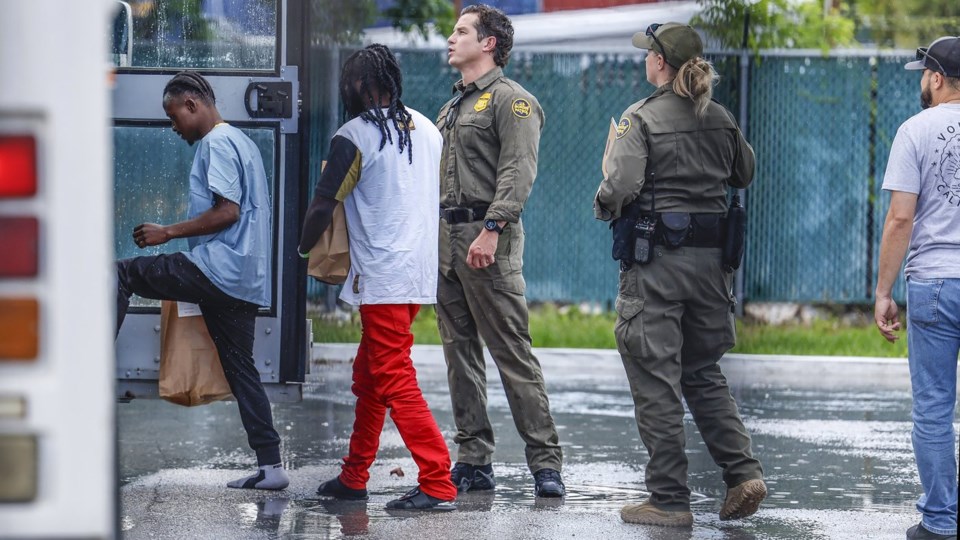SAN DIEGO (AP) — About 300,000 Haitians already in the United States will now be eligible for temporary legal status allowing them to remain in the U.S. and work because conditions in the strife-torn Caribbean nation are considered unsafe for them to return, the Homeland Security Department said Friday.
The decision marks a major expansion of Temporary Protected Status for Haitians and won praise from many in the Haitian and immigration advocacy community.
The TPS designation was created by Congress in 1990 to prevent deportations to countries suffering natural disasters or civil strife. The Homeland Security secretary can grant temporary protection for different nationalities based on conditions in their home countries. It’s generally for a designated period, and people have to apply for the protection and prove they qualify for it. The protection also allows them to apply for a work permit.
This expansion will apply to Haitians who were in the United States on June 3 and will last until Feb. 3, 2026. Anyone arriving after June 3 would not qualify. Separately, Mayorkas also extended the Temporary Protected Status of an estimated 200,000 Haitians who already had it. Their extension will also last through Feb. 3, 2026.
The move — one of the largest expansions of TPS — draws another sharp policy contrast on immigration between President Joe Biden and his predecessor, Donald Trump, who sought to end temporary status for many countries, including Haiti, during his tenure in the White House.
Gangs have pillaged their way through the Haitian capital of Port-au-Prince and surrounding areas, killing, raping and kidnapping thousands of people in recent years and leaving hundreds of thousands of others homeless and unemployed, which in turn has deepened poverty.
“Several regions in Haiti continue to face violence or insecurity, and many have limited access to safety, health care, food, and water,” Homeland Security said in a press release. “Haiti is particularly prone to flooding and mudslides, and often experiences significant damage due to storms, flooding, and earthquakes. These overlapping humanitarian challenges have resulted in ongoing urgent humanitarian needs.”
About 200,000 Haitians already have TPS under previous offers, according to the Congressional Research Service, the first one after a devastating earthquake in 2010 and the second amid political turmoil in 2021.
One of those people is Fanor Massolas. He's originally from a town in southern Haiti. He qualified for the temporary protection granted in 2010. With it, he's able to work at the Los Angeles airport where he has a job with a contractor. He said it's always stressful wondering whether the protection will be renewed but it's better than not having any protection at all. Going back to Haiti is not an option, Massolas said.
Massolas said he considers the U.S. his home even though he doesn't have citizenship. This is where he lives, where he works, where he's been able to go to school and learn English.
“Every human being, first thing they need is safety wherever they are. I’m in a safe county," Massolas said. Speaking of Haiti he said: “Nobody is safe over there."
With the expansion announced Friday, Homeland Security estimated that an additional 309,000 Haitians will be eligible for the protected status.
Nearly 900,000 people from 16 countries are currently registered for TPS, with the largest nationalities hailing from Haiti, Venezuela, El Salvador, Honduras and Ukraine.
The TPS designation gives people legal authority to be in the country and the right to work but it doesn't provide them a long-term path to citizenship. And they are reliant on the government renewing the status when it expires, giving them little stability. Conservative critics have also said that over time the renewal of the protection status becomes automatic, regardless of what happens to country conditions.
Haiti has been a thorny challenge for an administration that has sought to discourage illegal crossings, most recently by temporarily suspending asylum processing for people who cross the border illegally. The administration said this week that arrests for illegal crossings have fallen more than 40% since asylum was halted.
In 2021, about 16,000 predominantly Haitian migrants assembled on the banks of the Rio Grande in the small Texas town of Del Rio, triggering large-scale deportations. Then border arrests of Haitians fell sharply, even before January 2023, when the administration introduced an online app, called CBP One, which is needed to enter the country legally at land crossings with Mexico, and began allowing up to 30,000 people a month from Cuba, Haiti, Nicaragua and Venezuela to fly to the country for two years if they have financial sponsors.
Haitians were arrested only 142 times for crossing the border illegally from Mexico in May, down from a peak of nearly 18,000 in September 2021, but some take the dangerous route by sea. On Wednesday, a group of more than 100 Haitians arrived in a sailboat off the lower Florida Keys.
The Haitian Bridge Alliance, like other advocacy groups, applauded the administration for “a crucial move,” while also urging it to halt deportations to Haiti.
But Homeland Security signaled that deportations would continue for those who try entering illegally, saying it “will continue to enforce U.S. laws and policy throughout the Florida Straits and the Caribbean region, as well as at the southwest border.”
__
Santana reported from Washington.
Elliot Spagat And Rebecca Santana, The Associated Press



